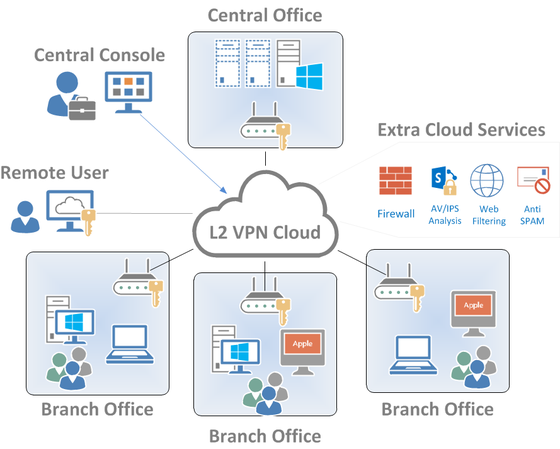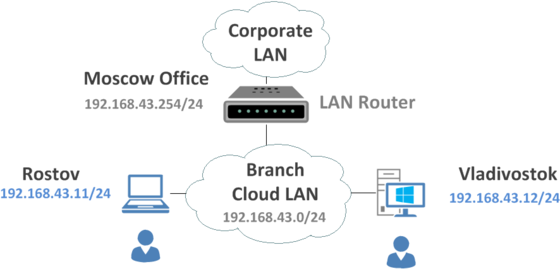Answer the question
In order to leave comments, you need to log in
RST Cloud L2 VPN cloud with additional MSSP services
Greetings!
I decided to describe my project, which is under development. The impetus for this was the situation that has developed on the market, in which the L2 VPN organization mainly uses MPLS technology, less often VPLS.
Technically, MPLS allows you to build point-to-point links, while VPLS actually creates a single virtual switch distributed over different cities. At the same time, MPLS / VPLS do not imply encryption, which requires the use of additional tunneling through the usual IPSec, which is not always possible and justified. In fact, such double encapsulation leads to inefficient use of the already not very wide channels in Russia, an increase in delays and a decrease in data transfer speed. In addition, MPLS services cost some money and not all providers provide them, since the availability of the service depends on their technical equipment. For example, let's take Rostelecom: the cost of accessing "Unlim Corporation 512" (512 Kbps) to the Internet for business is 2500 rubles. per month, and MPLS-connection of one point at the tariff "Business VPN-MPLS Interregional" (512 Kbps) - already 18,920 rubles. per month. Already in 2011, the MPLS market was 11 billion rubles. In fact, the question arises of creating an alternative method that will receive the technological advantages of MPLS VPN, the security and ability to compress IPSec traffic, and the cost comparable to providing regular Internet access for legal entities.
Now imagine that you have the opportunity to combine several offices into a single network without much hassle, as if they were working in the same building. Or, for example, connect computers located in different parts of the world with one virtual switch, as if they were in the same room.
All this is possible thanks to RST Cloud with L2 VPN technology provided as a cloud service:
The cloud services being developed are being implemented as an information security project aimed at increasing the efficiency of building and maintaining a branch network, reducing companies' costs for maintaining a VPN infrastructure and obtaining new technological capabilities that were previously available only with the purchase of top-end expensive network devices. The objective of the project is to develop software for building a VPN cloud that provides connectivity to everyone at the L2 level with the provision of additional security services.

For the user, the cloud is absolutely transparent and looks the same as a regular local network. In fact, for users, the interaction will be direct with no visible transit devices. At the same time, all interactions between different sites are controlled by the cloud! In addition, the default solution provides traffic compression in the VPN tunnel, which for some types of traffic gives an increase in channel bandwidth by 6-8 times!
And what does it look like from the point of view of a network administrator? But like this!

All network nodes are located in the same subnet of the main site. At the same time, if desired, the administrator can group branches in the cloud web interface in order to connect them to different VLANs of the head office.
Key features of the solution:
– flexibility of connecting to the cloud:
- convenience:
– performance:
- security:
– ease of installation and maintenance:
– ease of payment:
Answer the question
In order to leave comments, you need to log in
Didn't find what you were looking for?
Ask your questionAsk a Question
731 491 924 answers to any question